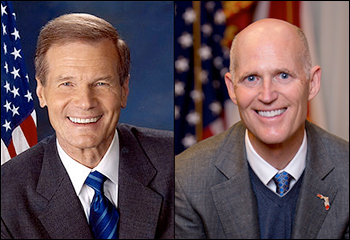By Jim Ellis
Feb. 9, 2018 — The 2018 Florida Senate race is on the cusp of becoming one of the top political campaigns in the country, but polling has been scarce … until yesterday.
Three different pollsters released data from their recent Florida electorate surveys, each testing the impending contest between Sen. Bill Nelson (D) and Gov. Rick Scott (R). Though the governor has not announced his candidacy, a loosely affiliated Super PAC has been spending heavily touting his accomplishments through various substantial statewide media buys. Since no other Republican candidate is even contemplating running, few doubt that the governor will make the race.That being said, Florida Atlantic University, the University of North Florida, and Mason-Dixon Polling & Strategy all released surveys this week. Though each arrived at different ballot test results, and all three have some methodological flaws, it is clear that the overall conclusion tells us that the Florida campaign is already in the toss-up realm.
The FAU poll (Feb. 1-4; 750 registered Florida voters; 375 on-line, 375 via automated telephone system) returns the most surprising result. According to their sampling universe, Gov. Scott has a 10-point, 44-34 percent lead over Sen. Nelson. This seems far-fetched, especially in comparison with the two succeeding polls taken during the same time frame. Additionally, the polling sample contains too many Independents, and is a bit low for both Democrats and Republicans. This makes the ballot test response even more curious and suspect.

